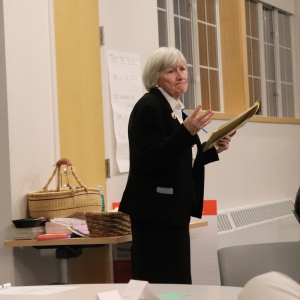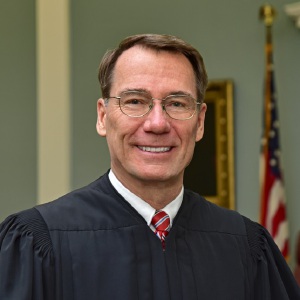NH attorney general asks federal appeals court to reinstate ‘divisive concepts’ law struck down by lower court

gavel Elizabeth Frantz
| Published: 04-08-2025 7:26 PM |
Lawyer Charles Moerdler argued in a federal appeals court that New Hampshire’s so-called “divisive concepts” law could bar him from teaching about being a survivor of the Holocaust.
“Our function as teachers is to give kids a background – a full background – to tell them what the world is like,” Moerdler said during oral argument in the case before the First Circuit Court of Appeals. “… Am I barred from teaching that in the state of New Hampshire? I am.”
“I’ve been there before,” he added. “I don’t want to return.”
It is unclear whether the law – which would bar educators from teaching students about a range of concepts related to race, gender, religion, and other protected characteristics – would in fact prevent Moerdler from teaching about the Holocaust. But that uncertainty, he argued, was precisely his point.
“Every teacher in the state of New Hampshire – bar none – has the clear view, ‘I better not get near that subject’,” Moerdler said, referring broadly to topics that involve the 13 characteristics the law places restrictions around.
The oral argument reopens a court case that has potentially wide implications over government involvement in what educators can say in the classroom. Last May, a federal judge in New Hampshire struck down the 2021 law, ruling it unconstitutionally vague. The state of New Hampshire appealed that decision, arguing that teachers’ speech was an aspect of their official duties and thus the vagueness of the law did not rise to the level of violating their First Amendment rights.
During the hour-long oral argument, the three judges on the panel, like Moerdler, expressed skepticism of that view.
Judge Seth R. Aframe described the law as creating “unknown hot zones” – areas that “the state of New Hampshire would like you not to teach about.”
Article continues after...
Yesterday's Most Read Articles
 Federal judge finds Bow School District’s actions ‘entirely reasonable’ in transgender athlete protest by parents
Federal judge finds Bow School District’s actions ‘entirely reasonable’ in transgender athlete protest by parents
 Propane tanker truck rolls over on I-93, holds up traffic
Propane tanker truck rolls over on I-93, holds up traffic
 Another lawsuit delays Steeplegate Mall demolition
Another lawsuit delays Steeplegate Mall demolition
 Concord superintendent joins over 100 school leaders in signing controversial DEI certification, but says equity work will continue
Concord superintendent joins over 100 school leaders in signing controversial DEI certification, but says equity work will continue
 New Hampshire set to ‘welcome home’ veterans with new 15-acre campus in Franklin
New Hampshire set to ‘welcome home’ veterans with new 15-acre campus in Franklin
 High schools: Opening day results for softball, baseball and lacrosse
High schools: Opening day results for softball, baseball and lacrosse
“We’re not really going to tell you really what they are,” he said. “So you just create a lot of big circles so that the areas you can teach become really small and the things you can't become really large because we haven't given you enough direction to know the difference.”
Moerdler represents one of the teachers’ unions and some of the educators who sued the state when the law was signed by former Governor Chris Sununu in 2021. They have argued that if the law goes into effect, it would stifle their ability to teach a range of topics without risking their credentials.
The law bans educators from teaching four concepts, including that any one group is superior to another based on a range of identity characteristics; that any one group is inherently racist or sexist; that an individual should be discriminated against based on their identity; and that students should not “treat others without regard” for various identity characteristics.
Senior Assistant Attorney General Mary A. Triick argued that because educators are executing their official duties when they teach, the lack of specificity in the law is permissible.
“The reason teachers don’t have First Amendment protections in their curricular speech is because it doesn’t offend the First Amendment when the state says, ‘We have these public schools and we are going to control what our students are taught in the public schools and we are going to hire teachers to teach those things’,” Triick said.
“If you say that the state cannot control that speech, can that teacher say anything to that student?” she asked. “Like what if the teacher is saying that the beliefs of the Nazis were a good idea?”
While the law was enacted during the beginning of the Biden administration, the oral argument comes during a starkly different political landscape. During his first two months in office, President Donald Trump has made attacking diversity, equity, and inclusion programming a central component of his political agenda.
One of the teachers’ union plaintiffs in the “divisive concept” lawsuit, the National Education Association, sued the Trump administration last month, challenging the constitutionality of a directive to root out DEI in programming. The arguments in their legal complaint mirror many of those made during Tuesday’s oral argument.
Jeremy Margolis can be contacted at jmargolis@cmonitor.com.







 Bassett to retire from New Hampshire Supreme Court
Bassett to retire from New Hampshire Supreme Court Swanzey forest stewards battle red pine killer
Swanzey forest stewards battle red pine killer Driver acquitted in bikers’ deaths in New Hampshire pleads guilty to impaired driving in Connecticut
Driver acquitted in bikers’ deaths in New Hampshire pleads guilty to impaired driving in Connecticut Granite Geek: It takes a village to keep nasty bugs away
Granite Geek: It takes a village to keep nasty bugs away
